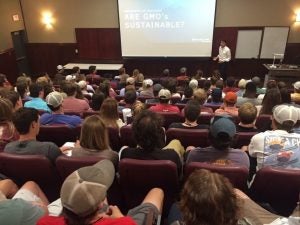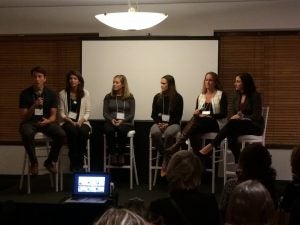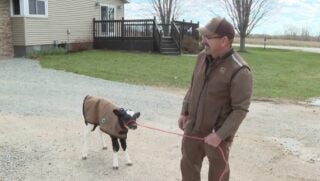Before taking the Director of Millennial Engagement position with Monsanto in 2014, Vance Crowe wasn’t a household name in AgChat and foodie circles.
Growing up in Eureka, Illinois, Crowe was somewhat familiar with baling hay, walking beans, and detassling corn, but really had no idea how farming was connected to food. Before coming to Monsanto, he had heard the familiar ominous stories about the company and had the sense that the business had bad relationships with farmers and was a negative force in the world … that was until he decided to interview for a position with the company.
In fact, he admits he really only took the interview because, “well, who doesn’t want to see the inside of a veritable Mordor.”
All joking aside, the communications professional says what he found during that interview defied everything he thought he knew about agriculture and further established that Crowe was the right person for the job.
With three years under his belt, we decided to check in with Crowe to see just what it’s like to be the Director of Millennial Engagement for one of the world’s agricultural giants.
What former career and/or personal experiences made you think this position would be a good fit for you, as well as Monsanto?
The best experience that I brought to the role was that I had lived and worked among many communities that had very negative opinions about the value of modern agriculture. I had worked in community public radio, worked as a deckhand on an eco-tourism ship, been a volunteer with the U.S. Peace Corps, among other jobs–that put me in social circles of people that (like me) vastly over-estimated their understanding of agriculture, biotechnology, science, and the positive impact of capitalism.
When I joined Monsanto, they were just beginning a massive transformation, perhaps the first of its kind; we reoriented our communications approach to talk with general consumers who buy almost nothing at all from us, and yet have very strong feelings about who we are and what we represent. I immediately felt that my opinion and experience was valued because the company deeply wanted to know what average consumers thought, and why they felt that way.

We know you aren’t just sitting on Twitter all day, what’s a typical day for the Director of Millennial Engagement?
I spend a lot of time traveling to give talks and participate on panels at college campuses, scientific conferences, and at public meetings, but that travel is only part of my responsibilities. Monsanto’s employees are deeply interested in understanding the concerns of the broader public. Because I have such close contact with the general public, I am often invited to address groups inside Monsanto to discuss how our scientists, executives, sales teams, engineers, and others can communicate with regular people who have been made to feel afraid of farming and of the company.
Candidly, the toughest part of my job is not speaking externally, it is speaking internally about what I am saying externally. There is a very rigorous culture inside of Monsanto to be highly precise in what you say about our technology. Scientists will take me to task if they think there is even a slight chance of misinterpreting what I am saying or if I am speaking beyond my knowledge base.
When I’m not speaking, I am usually learning! I have chemists willing to tutor me to understand our crop protection products, biologists give me tours of their weed projects, agronomists help me learn the business of farming, and data architects teach me about graph theory. There is an incredibly high expectation that I be competent when talking about our business, so I am constantly challenged to tour, read, ask questions, and get feedback about how to get more precise.
With three years under your belt in this position, what has been the biggest challenges, biggest wins in reaching millennials?
The biggest challenge is to stay attentive to what people’s concerns actually are. When you are deep in a subject it is easy to start to turn your critic’s points of view into caricatures of what they actually believe. I have to challenge myself to intensely listen to people’s concerns and try to hear what they wanted to know even if they are not articulate or well informed. I remember how scary it was to be a person that did not really know a farmer or have access to scientists that could answer my concerns. People will only care about your thoughts on a question if they feel like you really understood their concerns. When I respond, I try to give them the freedom I received when I realized I did not have to fear modern agriculture.
The biggest win is hard to really nail down. We have had success reaching consumers that I think was simply unimaginable just a few short years ago. We have been invited to speak at art schools in downtown Manhattan, we are invited to teach rooms filled with dietitians on how to connect with their most fearful patients, and address some of the most advanced scientists in fields like synthetic biology. These are all spectacular invitations. But the satisfaction of my work comes from experiences like sitting on a plane next to a mom that is surprised and even a little upset when she discovers I work at Monsanto. Sometimes, when our conversation goes well, I am able to help her put down all of the fear and guilt she has because activists have made her feel afraid of not buying the most expensive food. It is an amazing feeling to watch someone put down fear they’ve held for years.

If you google the job title “Director of Millennial Engagement” only your name comes up — A relatively new career field, especially in agriculture, who do you go to for advice and mentorship?
I am so very grateful for the number of people that have actively sought me out to help me learn and grow in this complex role. Early on in my career at Monsanto a geneticist named Dr. Fred Perlak started giving me daily lessons. It started out focused on science but over time he became someone that helped me learn how to approach tense situations, build better relationships, and listen better. Dr. Perlak is just one of many people that have gone out of their way to guide and mentor me.
Why do you think this position in something every corporation, whether ag or not, should consider having on their team?
At its core, my job is about understanding the changing waves of culture. Any company that is going to try to surf on the edge between the old and the new should have people that are dedicated to understanding what looks like the chaos of culture change. I don’t know that they need to be named Director of Millennial Engagement, but the value of understanding how and why the waves of culture are changing cannot be overstated. The ability to identify and adapt to change is what determines if a company will survive.
Finally, what have you learned from this position that you actively try to pass on to farmers and ranchers that wants to engage with millennials?
Ninety-eight percent of people aren’t farming—and we’re trying to help the 2 percent be confident in sharing what they do. Consumers genuinely feel like they are supporting you when they watch documentaries that describe some farmers as victims. They make decisions at the grocery store imagining that they are doing the right thing. It is critical that you create internet artifacts that general consumers can find and have their perception of you changed for the better. You can create dynamic YouTube videos like @RiceFarmingTV or be clever on Twitter like @Faber, insightful like The Shark Farmer Podcast, or become a Wikipedia editor of crops you know a lot about. If you don’t participate in creating the definition of what it is to be a modern farmer, others will control the discussion and they will nearly always cast you as the villain.



